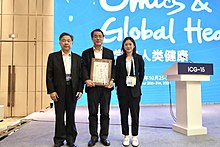Zhang Yongzhen | |
|---|---|
张永振 | |
 Zhang Yongzhen in Wuhan collecting the GigaScience Prize. | |
| Born | 1964 or 1965 (age 59–60)[1] |
| Nationality | Chinese |
| Occupation | Virologist |
| Zhang Yongzhen | |||||||
|---|---|---|---|---|---|---|---|
| Traditional Chinese | 張永振 | ||||||
| Simplified Chinese | 张永振 | ||||||
| |||||||
Zhang Yongzhen (Chinese: 张永振; pinyin: Zhāng Yǒngzhèn), also known as Yong-Zhen Zhang,[2] is a Chinese virologist known for his work relating to the COVID-19 pandemic.[3] A professor at Fudan University, Zhang has discovered numerous RNA viruses and created a network of labs dedicated to monitoring new viruses.[3] He led the team that sequenced and published the genome of SARS-CoV-2, the virus that causes COVID-19, in early January 2020.[4][5]
According to Time, Zhang was the "saving grace" of the COVID-19 pandemic. Zhang's team's success in discovering and publishing the virus's genome allowed scientists to quickly design COVID-19 tests, fight the pandemic, and begin developing COVID-19 vaccines.[6][7][3][8] A Chinese government order prohibited labs from publishing information about the virus at the time.[3] The day after the genome was released, Zhang's lab at the Shanghai Public Health Clinical Center was closed[9] after a visit by officials, who issued a "rectification" order. In an interview with the academic journal Nature, Zhang said he had not been aware of the prohibition on publishing the genome. He said that the lab closure was due to the officials ordering the lab to update its biosafety protocols, because equipment had been moved during construction work, and disputed reports that the shutdown was a punishment for publishing the genome. He said his lab members were still working on influenza, and were able to resume work on the coronavirus by the end of January.[3]
Zhang was named one of Nature's 10: "ten people who helped shape science in 2020",[3] and was winner of the 2020 ICG-15 GigaScience Prize for Outstanding Data Sharing during the COVID-19 Pandemic.[10] Alongside Edward C. Holmes, he was awarded the 2021 General Symbiont prize as an exemplar in the practice of data sharing at the Research Parasite Awards.[11] He was also one of Time's 100 most influential people of 2020[12] and Straits Times 2020 Asians of the Year.[13]
- ^ Cite error: The named reference
Time Chinese Scientist Who First Sequencedwas invoked but never defined (see the help page). - ^ Shi, Mang; Lin, Xian-Dan; Tian, Jun-Hua; Chen, Liang-Jun; Chen, Xiao; Li, Ci-Xiu; Qin, Xin-Cheng; Li, Jun; Cao, Jian-Ping; Eden, John-Sebastian; Buchmann, Jan; Wang, Wen; Xu, Jianguo; Holmes, Edward C.; Zhang, Yong-Zhen (December 2016). "Redefining the invertebrate RNA virosphere". Nature. 540 (7634): 539–543. Bibcode:2016Natur.540..539S. doi:10.1038/nature20167. ISSN 1476-4687. PMID 27880757. S2CID 1198891. Retrieved 11 January 2021.
- ^ a b c d e f "Nature's 10: ten people who helped shape science in 2020". www.nature.com. Retrieved 11 January 2021.
- ^ "Chinese scientist behind Wuhan lockdown gets Nature magazine top 10 accolade". South China Morning Post. 16 December 2020. Retrieved 11 January 2021.
- ^ "Wuhan doctor: China authorities stopped me sounding alarm on Covid". TheGuardian.com. 26 January 2021.
- ^ Sabeti, Pardis (22 September 2020). "Zhang Yongzhen: The 100 Most Influential People of 2020". Time. Retrieved 11 January 2021.
- ^ McKie, Robin (6 December 2020). "The vaccine miracle: how scientists waged the battle against Covid-19". The Observer. Retrieved 11 January 2021.
- ^ Cite error: The named reference
25 Days That Changed the World: How Covid-19 Slipped China’s Graspwas invoked but never defined (see the help page). - ^ Zimmer, Carl (21 March 2022). "'He Goes Where the Fire Is': A Virus Hunter in the Wuhan Market". The New York Times.
- ^ "COVID-19 Data-Sharing Hero Wins GigaScience Prize - GigaBlog". gigasciencejournal.com. Retrieved 2021-01-28.
- ^ "The Research Symbiont Awards". researchsymbionts.org. Retrieved 2021-01-28.
- ^ "The 100 Most Influential People of 2020". Time. Retrieved 11 January 2021.
- ^ Cite error: The named reference
:0was invoked but never defined (see the help page).
